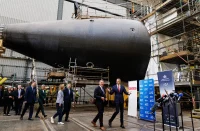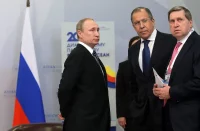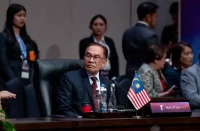Manish CHAND (India)
The second BRIC summit ended in Brasilia with a clarion call for “a new International order” to accommodate the aspirations of rising powers in International decision-making structures.
The leaders of the four top emerging economies, whose share in global economic development has exceeded 50 pc, in Russian President Dmitry Medvedev’s words, pushed hard for reforms of the UN and Bretton Woods institutions and affirmed the centrality of G20 as “the premier economic forum” to navigate the post-crisis recovery period. Acting in concert over issues of international governance, the summit pitched for including India and Brazil in an expanded UN Security Council.

Iceland’s volcanic ash and an earthquake in China’s Qinghai province may have threatened to overshadow the Brasilia summit, but that did not come in the way of a striking convergence of views among the leaders of fastest-growing emerging economies. Indian Prime Minister Manmohan Singh, Russian President Dmitry Medvedev, Chinese President Hu Jintao and Brazilian President Luiz Inacio Lula da Silva held wide-ranging talks at Itamaraty Palace, the imposing seat of the Brazilian foreign ministry.
The Indian economist-turned-prime minister also made a vigorous case for a “multipolar, equitable, democratic and just world order” at the daylong BRIC summit, which was advanced by a day as Hu Jintao had to cut short his trip due a massive earthquake in China. “Brazil, Russia, India and China have a fundamental role to play in building that new international order that is fairer, more representative and safer,” said Lula, the host of the second BRIC summit. Medvedev said the meeting showed that the BRIC format is maturing “and allows us to not only coordinate our efforts, but also make concrete decisions”. The joint declaration reflected this unanimity of views and stressed the group’s intent to see a “multipolar, equitable and democratic world order”, a formulation that is set to worry the US as it views groupings like BRIC, which challenges Western hegemony with suspicion. Seizing the initiative, the BRIC declaration called for “a comprehensive reform of the UN, with a view to making it more effective, efficient and representative” and asked the G-20 to be proactive and formulate a coherent strategy for the post-crisis period. Reforming the architecture of international financial governance, including the reform of the Bretton Woods institutions, the IMF and the World Bank, figured prominently in the declaration, a point stressed by Medvedev in an article ahead of the summit. “BRIC countries will be pushing for a successful accomplishment of the long overdue reforms of the Bretton Woods system now underway,” wrote Medvedev. The leaders of BRIC countries, which account for 20 pc of global GDP, focused a large part of their discussions on setting the pace and direction of global economic recovery.
Manmohan Singh, on his part, cautioned the world against complacency and pitched for closer collaboration in interests of long-term recovery. The four leaders also decided to scale up economic cooperation across areas like food and energy security and underlined the importance of maintaining relative stability of major reserve currencies and sustainability of fiscal policies in order to achieve a strong, long-term balanced economic growth.
Putting developmental aspirations of common people at the heart of their quadrilateral engagement, the BRIC summit, which was preceded by meetings of finance and agriculture ministers, governors of Central Banks and a Business Forum, also decided to scale up cooperation in areas ranging from science and technology, food and energy security to trade and investment, pharmaceuticals and infrastructure. Some Western commentators have tended to decry the BRIC as just another talk shop, but the first two summits have proved critics wrong with tangible achievements in the direction of the diffusion of power. The collective approach has helped BRIC to force a redistribution of 5 pc of voting shares in the IMF and 3 pc in the World Bank in favour of emerging and developing countries at the G20 summit in Pittsburgh last year. While an ambitious plan to replace the powerful US dollar with IMF’s SDRs, a pet theme at the Yekaterinburg summit, has been dragging; the BRIC countries have decided to use more of their own currencies in mutual trade and investment transactions. These declarations serve as pressure tac-tics on the world’s status quoits powers. The possibility of abandoning the US dollar was an attempt to put pressure on the world’s leading powers, says Evgeny Yasin, head of research at the Higher School of Economics in Moscow. “The four BRIC countries are developing a powerful and compelling critique of the current world order that resonates with people outside of the West, a critique coupled with fresh ideas for a new system of global economic and political governance,” writes Andrej Krickovic, a researcher at the University of California, Berkeley and Adrian Pabst, a lecturer in politics at the University of Kent. The two are part of an international project on BRIC 2025, a study of future scenarios for global politics from the perspective of the BRICs.
From New Delhi’s point of view, the endorsement by the BRIC communiqué for a greater role for India and Brazil in the UN has galvanized the stalled drive for expansion of the UN Security Council and finding permanent seats in the council for the emerging powers. “BRIC countries are uniquely placed to contribute to reforming the architecture of global governance,” said Manmohan Singh, encapsulating the emergence of BRIC as a formidable bloc in a multi-polar world.
The article was published at the April 2010 edition of ‘Russia & India Report’.














Pingback: BRIC Leaders Call For “New International Order” « Therearenosunglasses’s Weblog